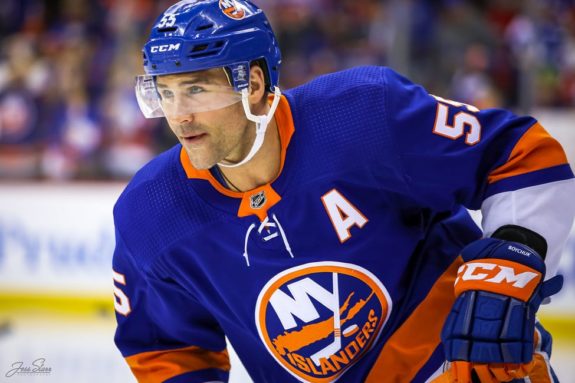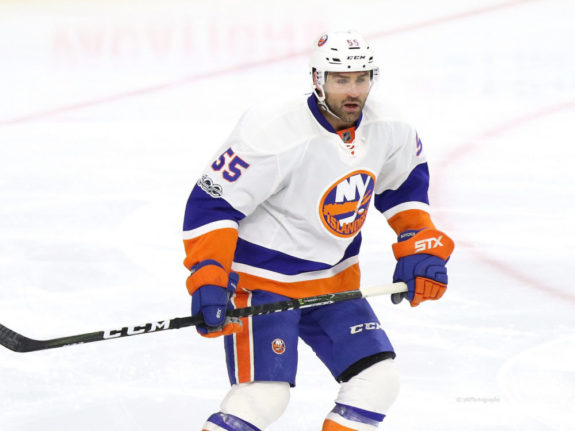*Article was originally published in Nov. 2020
Johnny Boychuk was a consistent, strong defenseman for the New York Islanders after he joined the team on Oct. 4, 2014, via trade. He impressed throughout his first year with the organization and earned a seven-year contract extension – but a hard decision might be coming.
Boychuk was one of the more reliable defense-first defensemen on the Islanders. However, it wouldn’t have been possible without the salary cap.
The Trade
Boychuk’s trade was the result of the Boston Bruins struggling with the salary cap. In exchange for the defenseman, New York sent the Philadelphia Flyers’ 2015 second-round pick, the Islanders’ 2016 second-round pick and a conditional 2016 third-round pick if the Islanders had traded Boychuk to another Eastern Conference team.
Related: The Islanders’ Exclusive 40-Goal Club
This was a rare scenario where everyone wins. The Islanders improved their defense without hurting their current roster and the Bruins got out of the cap crunch while acquiring picks. They also ended up using those picks pretty well.
Boychuk and Nick Leddy were acquired within hours of each other and in both instances, the trades didn’t affect the current roster. The trade for Boychuk specifically shored up defensive problems on the blue line. During the 2013-14 season, the Islanders gave up 267 goals against which was 28th in the league. In Boychuk’s first season, the Islanders allowed 230 goals for 22nd in the league. It wasn’t a tremendous jump, but it started trending things in the right direction for a young team.

What made Boychuk so good in Boston was his defensive and physical play. He became known as a defensive defenseman with a cannon of a shot that could take on a lot of minutes. Former Bruins general manager Peter Chiarelli admits in an article with NHL.com that none of the other Bruins’ defensemen (at that time) could replace Boychuk’s skill set.
Part of what made this trade such a big deal at the time was that it was a trade that former Islanders’ general manager Garth Snow got right. There was no debate, this was a great trade. Two second-round picks for immediate help on the back end is good, but getting someone with a great skill set in their prime? That’s a major win for the highly-ridiculed Snow.
In his first season with the Islanders, Boychuk did what was expected of him. He had strong defensive play, time on the penalty kill against the league’s top units and veteran leadership for a young defense core. Aside from Lubomir Visnovsky, Boychuk was the oldest defenseman on the Islanders at the time, and seven of the team’s 10 defensemen were 25 or younger. Boychuk also brought Stanley Cup experience for when the team was ready to take that next step in the playoffs.
You may also like:
- NHL Rumors: Islanders, Oilers, Capitals, Canucks
- Islanders’ 2022 Offseason Hits Standstill
- Islanders’ Reunion with Niederreiter Worth Considering
- Islanders’ 2022 Free Agency a Bust After 2 Days
- Islanders Unlikely to Trade for J.T. Miller After Rough Free Agency
One thing that wasn’t expected was how explosive Boychuk would be on offense. It’s no secret that the Edmonton native has one of the league’s hardest shots, but in his first season with the Islanders, Boychuk had his most offensive season to date. He tallied 35 points and nine goals with five power-play goals. Boychuk became an instant fan-favorite and both he and Leddy got seven-year contracts. Boychuk had a full no-move clause for the first four years of the contract and then a modified no-move clause for the remaining three years.
The trade proved to pay off in 2016 when the Islanders won their first playoff series in 23 years against the Florida Panthers. Boychuk didn’t have a point in that postseason but he did average 21:56 of time on ice. Remember, that was one of the things he did well in Boston. He ate a ton of minutes against the top lines of other teams.
On the Other Side
As previously mentioned, the Bruins used those two picks the Islanders sent them well. One of them was used on the upcoming defensive stud, Brandon Carlo. The American-born defenseman was selected 37th overall in the 2015 NHL Entry Draft.
Standing at 6-foot-5 and weighing at 212 pounds, Carlo is a massive force. He was originally advertised to have more offensive upside but has taken a more defensive and physical approach to his game in recent years. Proving that, his most offensive season was his rookie season in 2016-17 with 16 points in 82 games. Perhaps he finally found a balance though, because, in the 2019-20 season, Carlo had 19 points in 67 games. It’s worth mentioning that he had no power-play points.
Related: How Much Do Players Get Paid in the PLayofs?
His defensive side has been strong in the last two seasons. Carlo has amassed a total of 260 hits over the span of 139 games. That’s an average of 1.8 hits per game. In addition, the Colorado native has 164 blocked shots over the last two years. Coming in 139 games, that’s an average of 1.1 blocked shots per game. So even if his offensive side doesn’t show consistently, Carlo, at the bare minimum, is helping out his goalie and team morale by playing so defensive and physical.

The other pick resulted in the Bruins drafting defenseman Ryan Lindgren. He was the 49th overall selection in the 2016 NHL Entry Draft. He never got a chance to prove his worth to the Bruins, though. The Minnesota native was traded to the New York Rangers along with Ryan Spooner, Matt Beleskey, Bostons 2018 1st round pick and Bostons 2019 7th round pick in exchange for Rick Nash.
Lindgren is only 21 so it might be a while to figure out if he was a great draft pick or not. He was starting to fit in well in his rookie season with the Rangers high-powered offense and had one goal and 14 points in a bottom-six role with the club. In the span of 60 games this season, he was a plus 16 and had 94 hits. At the very least he seems responsible in multiple facets of the game.

So did the Islanders miss out on anyone? Sure, specifically on Carlo. What organization doesn’t want a big right-handed defenseman with potential upside on both sides of the puck? Lindgren’s case is still unproven because this was his rookie season in the league and he hasn’t truly excelled in one thing or another.
Related: Islanders With 100-Point Seasons
One thing to keep in mind is that if the Islanders had never traded for Boychuk and kept those picks, there’s no guarantee that they would’ve drafted either of those prospects. Re-drafts are easy to do because you base it off of current skills. However, if you go back to draft day where each team had its own plan, nothing is guaranteed.
A Tough Decision Looming
Sometimes history comes full circle. Whenever the 2019-20 season ends, New York, similar to Boston in 2014, is in a complicated salary cap situation. It has been tough to predict the last couple of offseasons for the Islanders. Everyone was sure John Tavares was staying in 2018, then people were sure Robin Lehner was staying and maybe Jordan Eberle or Brock Nelson was the odd man out in 2019.
None of those situations played out as expected. This offseason, the team has to make decisions about Derick Brassard, Matt Martin, Mat Barzal, Ryan Pulock, Devon Toews, Tom Kuhnhackl, Andy Greene, Thomas Greiss and the newly arrived Ilya Sorokin.
It goes without saying that not all of those players will be re-signed, but to those who are, how much can the Islanders pay them while still staying cap compliant? This all comes back to Boychuk because looking at age, cap hit and the depth at defense, he is a candidate to be moved sooner rather than later.

However, in the event Boychuk is moved, it could only be to certain destinations. The 2019-20 season was the first season of the contract where Boychuk has a modified no-trade clause. The clause includes a list of eight different teams he would accept a trade to.
So is it worth it to move Boychuk, if it’s even possible? For the sake of money, absolutely. However, for team morale and experience, it’s a much tougher decision. The Islanders look very different compared to when Boychuk first arrived in 2014, but he is still one of the few players with a Stanley Cup championship on his resume. No matter what they do with the salary cap situation, the decision on Boychuk will be a tough one.
Who Won?
So overall, who won the trade? The Islanders definitely did in the short term because they improved their blue line when they needed to at a relatively low cost. However, the Bruins were able to keep most of their core together by shedding Boychuk’s salary and returned to the Stanley Cup Final in 2019. Carlo is and will be a massive piece on their blue line moving forward. If Boston wins the Stanley Cup soon, one could argue that it won the trade in the long term. At this point in time, it’s a rare case of both teams winning because they each accomplished what they were trying to do.
